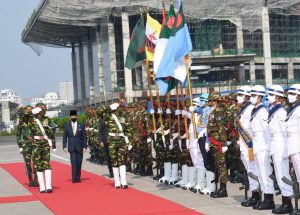Sultan of Brunei Haji Hassanal Bolkiah paid a state visit to Bangladesh on October 15-17 at the invitation of Bangladesh’s President M. Abdul Hamid and Prime Minister Sheikh Hasina. Notably, it was the sultan’s first official visit to Dhaka since the establishment of diplomatic relations on May 5, 1984. The purpose of the historic visit was to strengthen political and economic cooperation between the two countries.
Brunei Darussalam is a small but strategically located and oil rich Southeast Asian nation. Brunei proclaimed its independence on January 1, 1984. Bangladesh opened a resident diplomatic mission in Brunei in 1985, and Brunei reciprocated by launching its diplomatic mission in Dhaka. Ostensibly, bilateral relations between the two countries are embedded in the shared vision to promote peace, security, stability, and socioeconomic development. Besides religious bonds between the two majority Muslim countries, and their commonalities in tradition and culture, both also work closely in different international fora such as the United Nations, Organization of Islamic Conference, the Commonwealth of Nations, and the Non-aligned Movement.
With a total population of around 447,000 in October 2022, Brunei – one of the most recent nations to gain independence from the British Empire – has witnessed extraordinary economic development over the years. Driven by rising exports of oil and natural gas, it has emerged as a high-income country while also categorized as part of the developing world, a rare feat. Oil and gas have remained the central pillars of its economy ever since the resources were discovered in 1929. According to Trading Economics’ global macro models, Brunei’s GDP is projected to hit $16 billion by the end of 2022.
On the other hand, with an estimated population of over 168 million in October 2022, Bangladesh’s GDP is projected to top $460 billion this year. Bangladesh has enjoyed an incredible success story of economic transformation, refuting Henry Kissinger’s infamous label of Bangladesh as an “international basket case.” The country looks to become an upper-middle income nation by 2031 as it continues to make significant progress in reducing poverty, boosted by sustained economic growth and social progress.
Now both Brunei and Bangladesh are looking to further their economic successes through a closer partnership.
Mentioning the host country’s investment-friendly environment, in his meeting with Sultan Bolkiah, Bangladesh’s President Hamid called upon the business community of Brunei to invest in Bangladesh.
On the political front, Hamid expressed his expectation of full cooperation from Brunei to help Bangladesh attain the status of a Sectoral Dialogue Partner of ASEAN. Hamid also sought Brunei’s support for the safe return of more than 700,000 Rohingya Muslims sheltered in Bangladesh to their ancestral motherland in the Rakhine state of Myanmar. Most of the Rohingya refugees escaped state-sponsored violence and persecution in August 2017; Bangladesh has been pushing the international community to help ensure their safe return for over five years now.
In the sultan’s meeting with Bangladesh’s prime minster, Bolkiah and Hasina oversaw the signing of four important documents: an air services agreement; a memorandum of understanding (MoU) on the employment and recruitment of Bangladeshi workers; an MoU on cooperation in the supply of liquefied natural gas (LNG) and other petroleum products; and a MoU on the recognition of shipping certificates.
The MoUs seek to advance cooperation in several priority areas from the bilateral relationship. The MoU on energy presents an opportunity to explore mechanisms for long-term collaboration on the supply of LNG and other petroleum products to meet Bangladesh’s growing demand for energy. Notably, Brunei owns one of the largest LNG manufacturing facility in the world.
The MoU on employment represents the fact that Brunei is a favored destination for Bangladeshi migrant workers. Currently, about 20,000 workers from Bangladesh are in Brunei. According to the Bureau of Manpower Employment and Training (BMET), on average, about 5,000 workers from Bangladesh were hired yearly in Brunei before the COVID-19 pandemic. However, only 950 Bangladeshi workers were given jobs in Brunei between January 2020 and August 2022.
While the sultan’s visit to Bangladesh is historic, it should also been seen as the continuation of existing efforts to advance relations. Hasina officially visited Brunei from April 21-23, 2019, when six MoUs were signed to reinforce cooperation in the fields of agriculture, fisheries, livestock, and supply of much needed liquefied natural gas (LNG).
The first Foreign Office Consultations (FOC) between the two countries took place in Dhaka in September 2018 and the second round was held in Brunei in August this year. These are important engagements between the two countries to fully optimize the untapped potential in their relationship.
At present, Brunei-Bangladesh bilateral trade is insignificant both in terms of volume and value. According to the United Nations COMTRADE, Bangladesh exported goods worth just $2.86 million to Brunei in 2020. On the other hand, Brunei’s exports to Bangladesh totaled an estimated $30 million, with petroleum gas alone accounting for $29.9 million of that. As a result, Brunei’s trade surplus with Bangladesh is substantial.
However, there is scope for further expansion of trade with potential Bangladeshi exports such as ready-made garments, pharmaceuticals, leather products and processed food products (fruit juice, spices). Bangladesh has the capacity to meet all of Brunei’s garment requirements, since it ranks second in the world after China in terms ready-made garments exports, employing around 4.4 million people.
A shared vision to promote peace and economic prosperity are important features of Bangladesh-Brunei relations. Mutual cooperation has been growing over the past decades, but it is evolving sluggishly in arenas such as trade, investment, energy, and agriculture. The visit of Sultan Bolkiah and signing of an agreement and three MoUs will support building a resilient relationship and are likely to provide further impetus for the future development of an effective strategic partnership. That said, Bangladesh needs to vigorously pursue economic diplomacy and strong engagement with Brunei to promote its national interests.

































